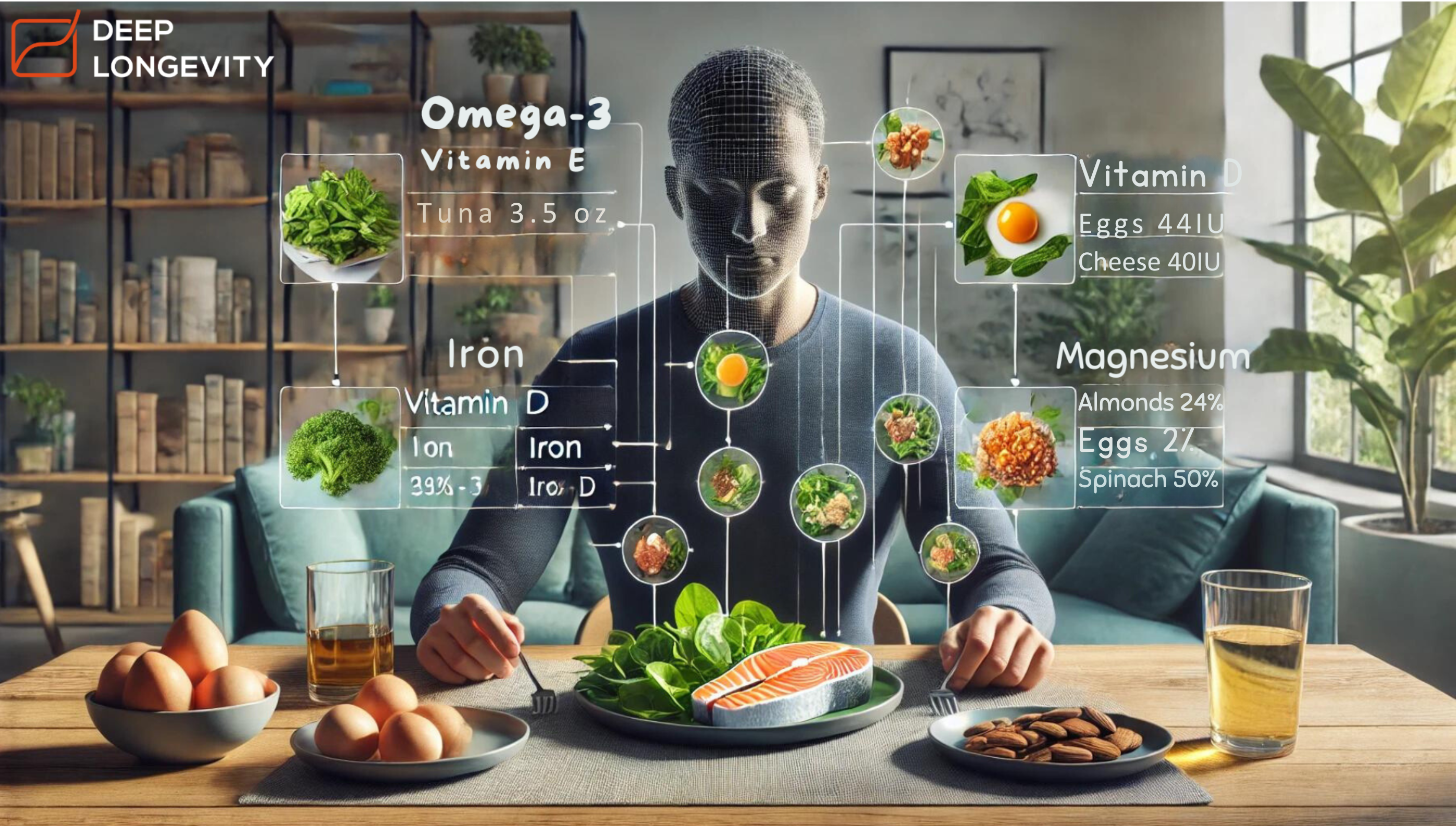
Aging is a natural part of life, but how well you age—whether you thrive with vitality or struggle with chronic ailments—can be significantly influenced by one of the most basic aspects of life: your diet. While it’s widely accepted that nutrition plays a vital role in health, the real game-changer is understanding that nutrition isn’t a one-size-fits-all solution.
This blog describes how our revolutionary Weekly Nutrition Summary ascertains that you’re having a balanced meal. Personalized diet recommendations integrate blood biomarkers, organ health scores and through AI-driven insights, help you age gracefully and vibrantly.
Misunderstanding Nutrition: A Major Barrier to Achieving Optimal Wellness

More than half of the global population consumes inadequate levels of several micronutrients essential to health, including calcium, iron, and vitamins C and E, according to a new study by researchers at Harvard T.H. Chan School of Public Health, UC Santa Barbara, and the Global Alliance for Improved Nutrition (GAIN). It is staggering to think that nearly half of the world’s population is deficient in essential micronutrients, often referred to as “hidden hunger.”[1]
Despite the abundance of food and information available, many people are unknowingly on diets that fall short of providing key vitamins and minerals. This widespread misunderstanding of our unique nutritional needs leads to imbalanced diets that do not just affect how we feel today – they shape how we age tomorrow.
The impact of poor nutrition is profound. Suboptimal intake of essential nutrients accelerates aging by weakening our immune systems, reducing skin elasticity, and heightening the risk of chronic diseases. Studies reveal that deficiencies in vital nutrients such as Vitamin D, Omega-3 fatty acids, and magnesium significantly contribute to premature aging. For example, a lack of Vitamin D is closely linked to osteoporosis and an increased risk of diabetes.
By not addressing these hidden deficiencies, we are unknowingly setting ourselves up for long-term health challenges, underscoring the importance of truly understanding and personalizing our nutrition to meet our body’s unique needs. Awareness is important for appropriate corrective action.
Nutrient Deficiencies and their Global Prevalence

Globally, nutrient deficiencies are rampant and often underestimated. Here’s a snapshot of some widespread deficiencies:
1. Iron Deficiency: Iron deficiency affects 1 in 4 people globally, especially in developing regions like sub-Saharan Africa and South Asia. These areas often have plant-based diets with low meat consumption, leading to iron deficiency anaemia, which hinders energy levels and cognitive development.[2]
2. Vitamin D Deficiency: Vitamin D deficiency is not exclusive to colder climates. Even in sun-rich regions like the Middle East and South Asia, people suffer from Vitamin D insufficiency due to limited sun exposure and dietary habits. This deficiency can compromise bone health and increase the risk of diabetes and autoimmune diseases.
3. Magnesium Deficiency: Nearly 70-80% of Americans are magnesium deficient, contributing to issues like high blood pressure, cardiovascular disease, and mental health conditions like anxiety. This is largely due to the high consumption of processed foods and insufficient intake of magnesium-rich foods like leafy greens.[3]
4. Zinc Deficiency: Zinc is crucial for immune function, wound healing, and DNA synthesis. Deficiency can cause stunted growth in children, impaired immune responses, and increased susceptibility to infections. Around 17% of the global population is estimated to be at risk of zinc deficiency, particularly in regions with limited access to zinc-rich foods (like meat and seafood) or poor bioavailability of zinc from plant-based diets.[4]
5. Iodine Deficiency: Iodine is essential for thyroid function, which regulates metabolism. Deficiency can lead to goiter (thyroid enlargement), intellectual disabilities in infants and children, and hypothyroidism. Iodine deficiency is particularly prevalent in regions where soil and water contain low levels of iodine, affecting approximately 2 billion people globally, including significant populations in Southeast Asia and Africa.[5]
Personalized Nutrition: Catering to Your Unique Needs
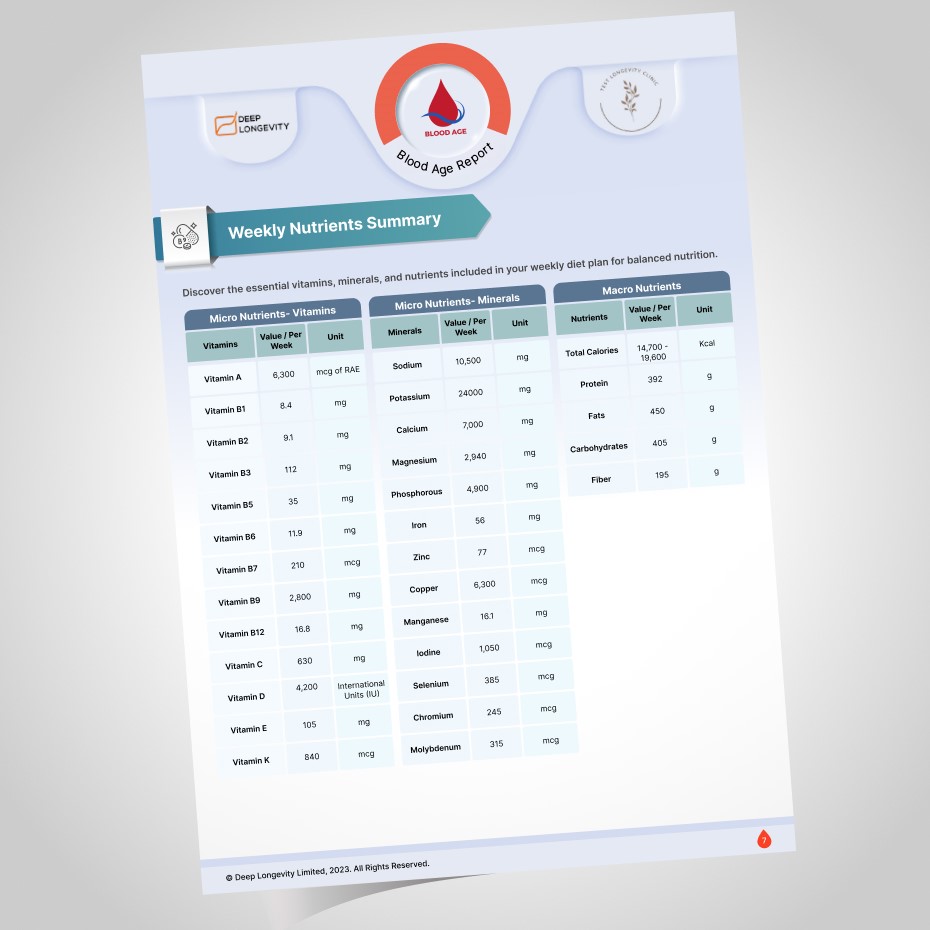
In the ever-changing realm of health and wellness, personalized nutrition stands out as an essential approach tailored to individual requirements. Recent advancements in technology, especially in artificial intelligence (AI) and machine learning, enable us to offer insights that are aligned with your unique genetic profile, lifestyle choices, and dietary habits.
At the heart of our approach is the Weekly Nutrition Summary, which leverages sophisticated algorithms analyzing your blood report to determine your dietary intake. This analysis breaks down your nutrient consumption into specific micronutrients and macronutrients, offering a comprehensive understanding of your nutritional status. Unlike generic diet plans, our summary is designed to adapt to your individual health requirements and align with your cultural and regional food preferences, creating a customized roadmap to optimal health rooted in science and personalization.
This ensures that you are not only meeting your daily nutritional requirements but are also optimizing your health for longevity.[6]
Blood Biomarkers and Organ Health: Data-Driven Nutrition
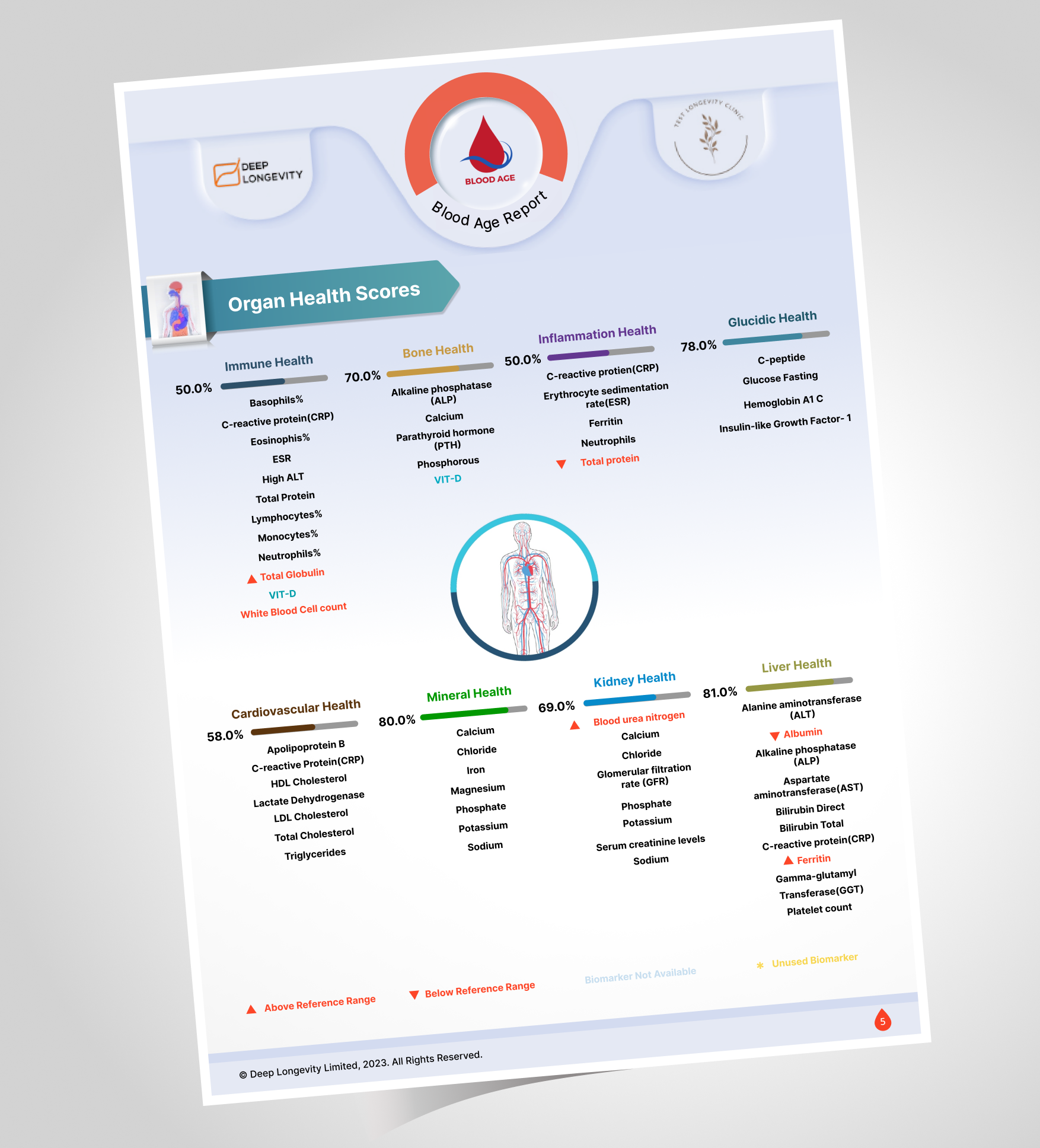
What makes our approach truly revolutionary is the integration of blood biomarkers and organ health scores. These biomarkers offer real-time insights into your health status, pinpointing deficiencies in essential nutrients. Combined with organ health data, our AI evaluates where your body may be struggling and offers tailored nutritional suggestions to close these gaps.
For example, if your biomarkers show a deficiency in calcium and Vitamin D, our plan will recommend specific foods—like dairy or fortified alternatives—that help meet your nutritional needs. These data-driven insights not only address your immediate deficiencies but also promote long-term health, ensuring you age with grace by maintaining a younger biological age.
The Weekly Diet Plan: Fuelling Your Longevity
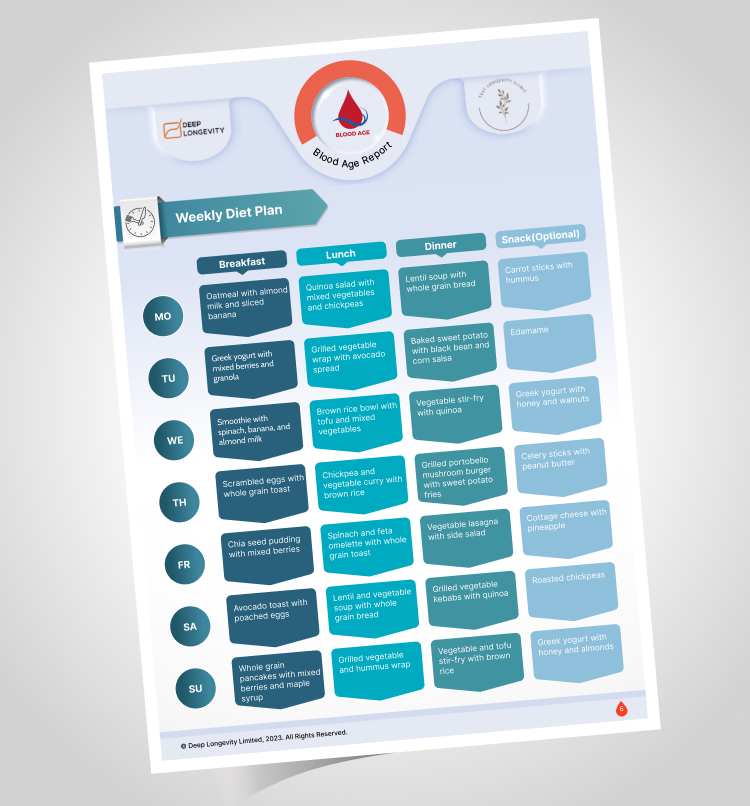
Our Weekly Nutrition Summary goes beyond identifying nutrient gaps by offering a well-balanced meal plan that ensures the intake of essential macronutrients and micronutrients. Each meal is carefully designed to provide a diverse range of vitamins, minerals, and healthy fats, supporting everything from heart and brain health to immune function. The plan includes nutrient-dense foods rich in Omega-3s, magnesium, fiber, and Vitamin D, tailored to meet your body’s specific needs.
This variety of meals focuses on whole foods that naturally deliver the essential nutrients required for optimal functioning and longevity.
Supplementing for Longevity
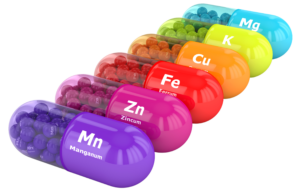
The use of dietary supplements is influenced by several factors, including dietary inadequacies, age, health status, lifestyle, and geographic factors. For nutrients that may still be missing in your diet—such as Vitamin D, Omega-3, or magnesium—our program offers personalized supplement recommendations. These supplements help ensure that all your micronutrient needs are met, filling in the gaps that whole foods alone may not cover.[7]
Conclusion: Personalized Nutrition is the Key to Longevity
Nutrition is far more than just calorie counting; it is about providing your body with the essential nutrients it needs to function optimally, and this can only be achieved through a personalized approach. By leveraging data from blood biomarkers, organ health scores, and AI-driven insights, our Weekly Nutrition Summary offers a holistic solution for healthier aging. Whether it’s adjusting your diet for regional deficiencies or ensuring your meals meet your body’s unique demands, personalized nutrition is the key to unlocking a longer, healthier life.
Ready to take control of your health and longevity? With our data-driven insights and personalized meal plans, you can confidently optimize your nutrition and promote vibrant aging.
The post Unlocking Longevity: How Personalized Nutrition Can Help You Age Better appeared first on Deep Longevity.